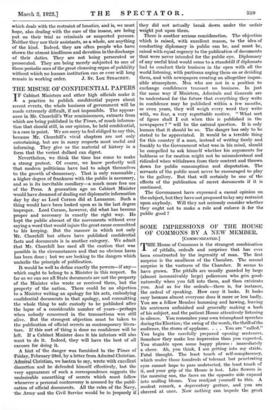THE MISUSE OF CONFIDENTIAL PAPERS
IF Cabinet Ministers and other high officials make it a practice to publish confidential papers about recent events, the whole business of government will be made extremely difficult, if not impossible. The appear- ance in Mr. Churchill's War reminiscences, extracts from which are being published in the Times, of much informa- tion that should still, 'in our opinion, be held confidential, -is a case in point. We are sorry to feel obliged to say this, because Mr. Churchill's vivid chapters are not only entertaining, but are in many respects most useful and informing. They give us the material of history in a form that the veriest dullard can digest.
Nevertheless, we think the time has come to make a strong protest. Of course, we know perfectly well that modern politicians have had to adapt themselves to the growth of *democracy. That is only reasonable ; a higher degree of frankness with the public is necessary, and so is its inevitable corollary—a much more free use of the Press. A generation ago no Cabinet Minister 'would have dreamed of dealing out diplomatic information day by day as Lord Curzon did at Lausanne. Such a thing would have been looked upon as in the last degree improper. Lord Curzon, however, did what has become proper and necessary in exactly the right way. He kept the public abreast of the movements without ever saying a word that would injure the great cause committed to his keeping. But the manner in which not only Mr. Churchill but others have .published confidential facts and documents is in another category. We admit that Mr. Churchill has used all 'the caution that was possible in the circumstances and that no obvious harm has been done ; but we are looking to the dangers which underlie the principle of publication.
It would be well to define exactly the powers—if any— which ought to belong to a Minister in this respect. So far as we can see all State documents are not the property of the Minister who wrote or received them, but the property of the nation. There could be no objection to a Minister writing an apology for his acts, embodying confidential documents in that apology, and committing the whole thing to safe custody to be published after the lapse of a considerable number of years—perhaps when nobody concerned in the transactions was still alive. But the strongest objection must be taken to the publication of official secrets as contemporary litera- ture. If this sort of thing is done no confidence will be left. If a Cabinet Minister does it his inferiors will also want 'to do it. Indeed, they will have the best of all excuses for doing it.
A hint of the danger was furnished in the Times of 'Friday, February 28rd, by a letter from Admiral Christian. 'Admiral Christian, we hasten to say, wrote with excellent discretion and he defended himself effectively, but the very - appearance of such a correspondence suggests the undesirable unearthing of secrets which must follow whenever-a personal controversy is aroused by the publi- cation of official documents. All the rules of the Navy, -the Army-and the Civil Service would be in jeopardy if they did not actually break down under the unfair weight put upon them.
There is another serious consideration. The objection which is raised, with excellent reason, to 'the idea of conducting diplomacy in public can be, and must be, raised with equal cogency to the publication of documents that were never intended for the public eye. Diplomacy of any useful kind would come to a standstill if diplomats had to conduct their business in the open with all the world listening, with partisans urging them on or deriding them, and with newspapers creating an altogether impos- sible atmosphere. Men who are not in a position to exchange confidences transact no business. In just the same way if Ministers, Admirals and Generals are to understand for the future that everything they write in confidence may be published within a few months, or even years, they will weigh every word they write with, we fear, a very regrettable motive. " What sort of figure shall I cut when this is published in the newspapers ? " will be the natural question. It is only human that it should be so. The udanger has only to be stated to be appreciated. It would be a terrible thing for this country if a man, instead of writing freely and frankly to the Government what was in his mind, should be compelled to ask himself whether his arguments for boldness or for caution might not be misunderstood and ridiculed when withdrawn from their context and thrown down for public consumption and disputation. The servants of the public must never be encouraged to play to the gallery. But that will certainly be one of the effects of the publication of secret documents if it is continued.
The Government have -expressed .a casual opinion on the subject, but they have not proposed to lay any restraint upon anybody. Will they not seriously consider whether they ought not to make a rule and enforce it for the public good ?










































 Previous page
Previous page